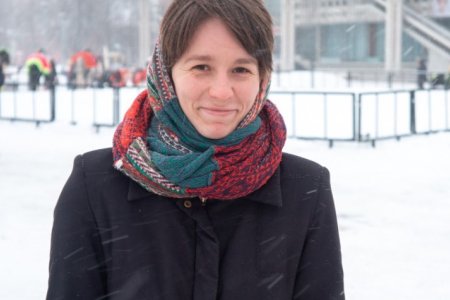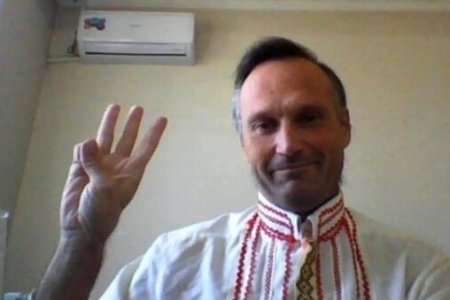
Journalist Anastasia Zhvyk is facing new prosecution in Russian-occupied Sevastopol with the administrative proceedings this time initiated over so-called ‘participation in an undesirable organization’. The participation in question would appear to be articles for the independent publication Meduza, although Zhvyk does write for other publications as well. Russia has escalated repressive measures against journalists and efforts to block all sources of truthful information since its full-scale invasion of Ukraine, with the arsenal of weapons used including labelling, and persecuting, journalists and media as ‘foreign agents’ or ‘undesirable organizations’. Riga-based Meduza was outlawed as ‘undesirable’ back in January 2023, and it seems that people are now even being prosecuted for reposting Meduza articles.
The prosecution against Zhvyk was passed to the occupation ‘Leninsky district court’ in Sevastopol on 23 April 2024, and is to be heard by ‘judge’ Yulia Sergeevna Stepanova on 23 May. The charge is under Article 20.33 of Russia’s code of administrative offences and, since it ‘only’ carries a fine, is by no means the worst persecution that journalists are exposed to in Russian-occupied Crimea. Russia has imprisoned over 20 Crimean Tatar or other Ukrainian journalists / civic journalists from Crimea on fabricated charges. Most were journalists for the Crimean Solidarity human rights initiative and reported on Russia’s mounting political persecution in occupied Crimea. Since the full-scale invasion, Russia has also abducted a number of journalists from other areas which have fallen under its occupation. In some cases, such as those of Serhiy Tsyhipa and, seemingly, Dmytro Khyliuk, insane ‘spying’ charges have been concocted. In others, the journalists were almost certainly seized by the Russians who have refused to provide any information about where they are being held.
Given the persecution that Zhvyk had faced since 2022, it is likely that she too would have ended up imprisoned, had she not left occupied Crimea, seemingly for Canada. By early 2023, Zhvyk had been fined twice for supposedly ‘discrediting the Russian army’. This was under one of four criminal or administrative charges rushed into law within ten days of Russia’s full-scale invasion of Ukraine. Article 20.3.3 of Russia’s code of administrative offences is supposed to punish for supposedly discrediting the armed forces and others involved in what Russia is euphemistically referring to as its ‘special military operation’. In fact, people have been fined under this article in occupied Crimea for singing or playing Ukrainian patriotic songs, waving a Ukrainian flag, or for demonstrating any opposition to Russia’s war of aggression against Ukraine. In February 2023, Zvyk told Crimean Realities that the full-scale invasion had come as a huge shock to her and that, by the following day, she had stuck a ‘No war’ sticker to her car. By 6 March 2022, two days after the new draconian measures came into force, administrative proceedings under Article 30.3.3 were initiated. In June 2022, she was fined 30 thousand roubles, with an occupation ‘court’ having thus agreed that the ‘No war’ sticker ‘discredited the Russian armed forces and their activities in Ukraine. Her appeal against the ruling was rejected. Zhvyk explained that she had been very careful for a while after that since she understand that a so-called ‘repeat offence’ could result in criminal charges. These are under either Article 280.3 of Russia’s criminal code (public actions aimed at discrediting the Russian armed forces; carrying a sentence of up to five years’ imprisonment) or Article 207.3 (‘fakes’ about the armed forces – up to 15 years). She had also been targeted in the media and especially on pro-Russian Telegram channels, and had even received death threats.
In October 2022, new administrative charges under Article 20.3.3 were initiated and Zhvyk subjected to a search, during which the enforcement officers removed her laptop and mobile phone. That prosecution was also before the occupation ‘Leninsky district court’ in Sevastopol. In January 2023, ‘judge’ Yulia Sergeevna Stepanova found her guilty of ‘discrediting the Russian armed forces’ and imposing a 40-thousand rouble fine. The ‘court’ ruling stated that one of Zhvyk’s social media posts contained a photo with the words ‘FUCK WAR’ and a text containing the words: “Blood pours from my eyes when I see ‘sieg heils’ around [the term used normally refers to the Nazi salute, but it is possible that here the ‘Z’ that has become a symbol for Russia’s war of aggression is meant. Another of the photos has the words ‘NO TO WAR’ as well as the following text: “It is always darkest before the dawn. The darkness will undoubtedly be replaced by the sun. The question is when is it darkest of us – is it totally dark now? Or will it still be worse. I suspect the latter.” Stepanova claimed that,, through her posts, Zhvyk had “undermined faith” in the 22 February 2024 decision which permitted the use of Russian armed forces outside of Russian territory, and that she had therefore committed the administrative ‘offence’ under Article 20.3.3 § 1 of the Russian code of administrative offences.
Zhvyk had not been present in ‘court’ and dismissed as outrageous the prosecutor’s claim that she had ‘admitted guilt’ with this treated as an extenuating circumstance. She rejected the charge and planned to appeal against the ruling, saying: “I don’t understand how it’s possible to admit to being guilty of saying that something white is white, and something black – black.”
By December 2022, Zhvyk had been forcibly added to Russia’s notorious list of so-called ‘foreign agents’ This results in onerous restrictions and demands to account to the authorities.
It may well have been around then that Zhvyk understood that, if she did not herself leave occupied Crimea, she might well end up arrested and imprisoned on the more serious criminal charges used to silence protest and truthful information about Russia’s war against Ukraine.



